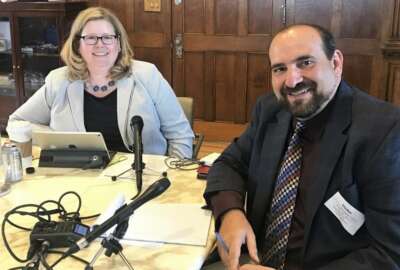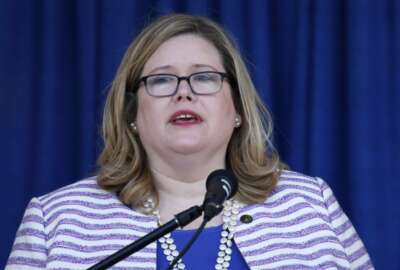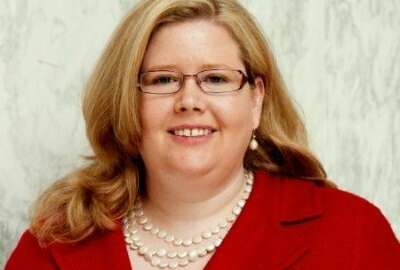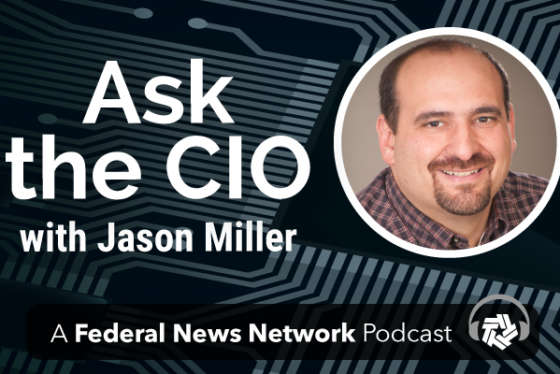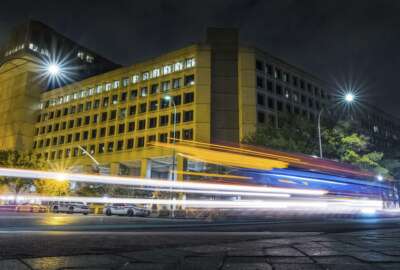
Exclusive
GSA’s Murphy opens up about her ascertainment decision, 3 years of successes, challenges
In her first public statements since the Nov. 23 decision to ascertain the election results, Emily Murphy, the GSA administrator, explained her thinking behind the...
In her three years as the administrator of the General Services Administration, Emily Murphy faced many a tough decision.
She decided it was time to consolidate the $38 billion multiple awards schedules program from 24 schedules down to one.
Murphy oversaw the implementation in all of the agency’s acquisition programs of the provisions addressing supply chain security that banned certain Chinese telecommunications products, addressing competition at the task order level and the somewhat controversial e-commerce platform program.
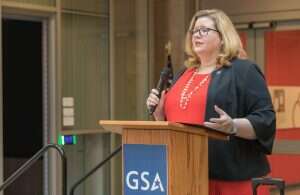
She also had to deal with the fallout of the FBI’s decision not to relocate to a new headquarters. Murphy had to decide how GSA should adapt and continue to thrive during the COVID-19 pandemic as well as provide contract support for other agencies to make buildings safer and technology available.
But the one decision that Murphy may be remembered most for was the one to ascertain the 2020 presidential election — that is, for when she actually made the ascertainment.
“Ascertain means to determine with certainty. So as a threshold matter, it’s important to note that, as the administrator, I wasn’t picking or certifying the winner of the presidential election. Instead, it’s the administrator’s role under the Presidential Transition Act to determine with certainty what resources and services should be made available to the apparent successful candidate to assist in the event of a presidential transition,” Murphy said in her first public interview since the Nov. 23 decision.
“The actual winner of the presidential election is clearly determined by the electoral process outlined in the Constitution,” Murphy added. “When I was looking at it, I was looking at what states were doing. And states don’t announce their official results until the votes are certified. That generally doesn’t happen for several weeks after the election. So I didn’t believe that it was my place to decide what challenges and recounts had merit. I waited for key developments involving certifications of the election results, and certain legal challenges to receive initial rulings. That didn’t happen until Nov. 23. As soon as it happened, I wrote my ascertainment letter.”
Murphy said 13 of the 15 presidential elections since the Presidential Transition Act became law in 1963 were decided almost immediately after the election. Only in 2000 did it take longer than normal, six weeks for Vice President Al Gore to concede.
She said because neither candidate conceded and states were in the middle of recounts, the ascertainment decision had to wait.
“I wanted sufficient or appropriate facts to point to so that it really was a determination with certainty as to who the apparent winner was. And as I said that I didn’t believe that that happened until Nov. 23,” Murphy said. “I want to be absolutely clear about this. And I put it in my ascertainment letter, no one in the White House, no one from GSA pressured me on the decision. It was my decision, and my decision alone. I want to be really clear on that.”
Researched Presidential Transition Act
Murphy added, she did her homework too. She said she talked with former GSA Administrator Dave Barram, who had to make the 2000 ascertainment decision, and read the history, the floor statements and the original text of the Presidential Transition Act.
“I made sure that I knew what the law was, and what guidance existed in the law, and committed that I was going to follow the law,” Murphy said. “Every morning, I got up, I looked in the mirror and committed that I was going to do what was right, I was going to follow the law. And until it was appropriate to ascertain, I wasn’t going to ascertain. I was going to just keep being the administrator of GSA and do my job.”
Murphy’s approach to ascertainment shouldn’t have been surprising. Over the last three years, her style of managing GSA has been as certain as it’s been collaborative. It’s been focused on today and the future. And, maybe most importantly, Murphy’s legacy will be more than her ascertainment decision, but how she built on the successes of past administrators and set GSA up for a successful future.
“GSA isn’t an agency where we pull 180s, where issues tend to be partisan issues; everyone’s in favor of good government. Everyone’s in favor of trying to increase competition,” she said. “We may have different tactics that we want [to use], but we all are trying to go to the same place.”
Murphy detailed that place through four priorities, which it should be noted are the same four priorities she outlined during her nomination hearing in 2017:
- Increasing competition and reducing waste
- Improving transparency
- Reducing duplication
- Providing ethical leadership
It’s rare for any leader, especially one in government, to both stick to a plan and accomplish significant goals within the plan, all during the course of often-short tenures.
Savings and customer satisfaction increased
“The thing I’m proudest of is that we’ve saved $21.3 billion over three years, and increased sales under GSA contracts by $20 billion in the same time period,” Murphy said. “To put that in perspective, I left GSA in early 2007, they were doing about $40 billion a year in contracts. By the time I rejoined GSA, that had grown to about $55 billion by 2018. So I’m incredibly proud of that. And I’m incredibly proud that we’ve kept the people at GSA safe during the COVID-19 pandemic.”
Murphy said it’s important to put the numbers in context.
“I want to highlight the increase of $20 billion doesn’t just reflect that the government spent more money. If you look at, for example, GSA’s share of IT dollars spent went from 21% to about 29% in those three years. We’re getting a larger market share. I think we’re doing that because we’ve been focused on customer loyalty, supplier satisfaction and employee satisfaction. Our fiscal 2020 customer loyalty scores are the highest it’s been since we started tracking, which in, to put it in perspective again, when it when I started as administrator in fiscal 2018, it was 7.5, on a scale of out of 10. It’s now at 7.9, which is really a fantastic achievement.”
It’s not just the customer loyalty scores that are the highest ever. GSA received positive feedback from its employees and its industry partners that demonstrate the changes and priorities are having their intended impact.
“We did a pulse survey earlier this fall, and in that we found that 93% of our employees said that they believe that managers at GSA clearly articulated and communicated the goals and priorities of the agency. And, 94% of the employees agreed with the statement, ‘My superviser listens to what I have to say.’ And 95% of the employees say they were clearly communicating and had the right protocols in place,” Murphy said. “We’ve brought customers, suppliers, employees all to a point where they say ‘we’re doing something right.’ But we’re putting the pieces together in the right way so that we’re delivering more value than we were before.”
More time for Section 876
This is not to say everything at GSA is perfect. The agency continues to face challenges, like every large organization, and there is plenty of work to be done. But Murphy, who many say has been the most qualified administrator in two decades, has been open and honest about her agency’s shortfalls.
“There are some things that it’s going to be really hard to walk away and say I didn’t finish. The implementation of Section 876 is one of those because I think it offers so much promise in terms of changing how we spend our vendors’ time, how we spend our employees’ time, and how do we drive the development of contracts,” she said.
Under Section 876 of the 2019 National Defense Authorization Act, Congress gave GSA the authority to test the concept of awarding a contract where price wasn’t a major factor. GSA is using its ASTRO procurement for unmanned autonomous vehicles and services as the first pilot. The Polaris small business governmentwide acquisition contract likely will be the second one.
Another near miss concerns the transparency of the schedules. Murphy said the e-Buy open pilot didn’t produce the results GSA was expecting, and transparency ended up reducing competition, not widening it.
“It made us realize that we needed to go back and reconfigure how we were trying to share the transparency and improve transparency. I think that there’s still a lot of opportunities to share more data on schedules,” Murphy said. “I think that the modernizations that are coming with catalog management will give us more data that we’ll be able to share publicly in the future. It’s an evolving process.”
Murphy added, “the ability to have catalogs that are uploaded and improve our data sharing going forward and reinvest in the systems because the GSA Advantage of today is better than the GSA Advantage of 2017. But the GSA Advantage still does not rival a commercial platform in terms of if you’re trying to go in and find a good or a service and buy it electronically. We still have work to do. And we still work to make that process more transparent, and frankly, just more user-friendly.”
Murphy said the Workforce 2030 initiative will help determine the future of GSA and whether the Public Building Service, the Federal Acquisition Service and the headquarters will continue to build on the successes of the last three years.
“We could have up to 75% of our employees teleworking the majority of the time [under Workforce 2030]. We can then take our success and help other agencies look at what the appropriate solution for them is going to be in the future,” she said. “I’ll be really eager to see how the next administrator takes that research and takes that opportunity because it brings not just PBS to the table, but also means that having secure systems, having secure supply chains, making sure we’ve got the right policies in place, making sure that the right technology is going home with employees or is in the office with them rethinking what the office of the future looks like.”
Murphy added the rhetorical questions. “Is it more SCIFs? Is it more meeting space? Is it more space to meet one-on-one with the public or to have large meetings with the public? Thinking through a lot of those options in the future. In each of those cases, GSA is really well positioned to be a leader in those spaces. They’re financially well positioned. They’re technically well positioned. And they’re reputational well positioned with the relationships that have been developed with our customer agencies that they can take what we’ve done in the last few years and build on it — and build an even greater GSA for tomorrow.”
Copyright © 2025 Federal News Network. All rights reserved. This website is not intended for users located within the European Economic Area.
Jason Miller is executive editor of Federal News Network and directs news coverage on the people, policy and programs of the federal government.
Follow @jmillerWFED
Related Stories
